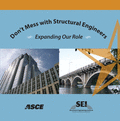Blast Response of Conventional and High Performance Reinforced Concrete Panels
Publication: Structures Congress 2009: Don't Mess with Structural Engineers: Expanding Our Role
Abstract
In response to recent terrorist activities, an increasing number of building projects specify design criteria for blast resistance, residual structural integrity, and survivability. Increases in structural system size, weight, and costs often are necessary to meet these criteria with conventional materials. However, using higher strength materials offers a way to mitigate these increases while achieving desired structural performance. The U.S. Army Engineer Research and Development Center (ERDC) investigated the effects of using vanadium micro-alloyed high-strength steel reinforcing bar coupled with high-strength concrete as a structural system. The combination of high-strength portland cement concrete and vandadium micro-alloyed rebar (HSPCC-Vr) meets or exceeds blast resistance criteria while allowing a more efficient structural design than can be achieved using conventional materials. Vanadium is widely used as an alloying element in steel production. Micro-alloying vanadium with steel reinforcing bar contributes to higher yield strengths than can be acheived with traditional Grade 60 rebar, without compromising ductility or formability. The ERDC team performed dynamic testing of one-third scale reinforced concrete panels using the Blast Load Simulator (BLS) at ERDC-Vicksburg. The panels consisted of double-mat conventional Grade-60 rebar or micro-alloyed vanadium rebar in combination with 4-ksi or 15-ksi concrete. Tests were performed using varying blast pressures and impulses to determine the performance of the different reinforced concrete panel combinations. During testing, the panels were constrained in the longitudinal (long) direction by simple supports, and were unsupported in the lateral (short) direction. Measured properties included center-span deflection, average blast pressure, and average impulse. The 4-ksi concrete in combination with micro-alloyed vanadium rebar provided the best alternative to the use of high-strength materials, but still had a lower level of blast protection. Permission was granted to publish this paper by the Director of the Geotechnical and Structures Laboratory.
Get full access to this article
View all available purchase options and get full access to this chapter.
Information & Authors
Information
Published In
Copyright
© 2009 American Society of Civil Engineers.
History
Published online: Apr 26, 2012
ASCE Technical Topics:
- Bars (structure)
- Blasting effects
- Concrete
- Continuum mechanics
- Design (by type)
- Dynamics (solid mechanics)
- Engineering fundamentals
- Engineering materials (by type)
- Engineering mechanics
- High-performance concrete
- Load and resistance factor design
- Load factors
- Materials engineering
- Metals (material)
- Panels (structural)
- Reinforced concrete
- Reinforcing steel
- Solid mechanics
- Steel
- Structural design
- Structural dynamics
- Structural engineering
- Structural members
- Structural systems
Authors
Metrics & Citations
Metrics
Citations
Download citation
If you have the appropriate software installed, you can download article citation data to the citation manager of your choice. Simply select your manager software from the list below and click Download.
